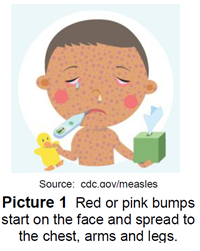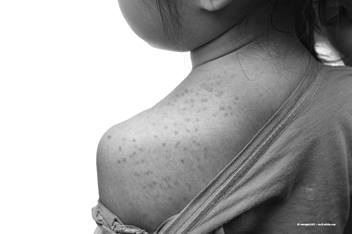Rubella
![]()
Rubella, also known as German measles, is an illness caused by a virus. Rubella is usually a mild illness that is now rare because of immunizations. Some people have it and do not even know it. However, if a person gets rubella and is not vaccinated, it can cause serious health problems. People at greatest risk are:
- Children younger than 5 years of age
- People with immune system problems
- People in their first 20 weeks of pregnancy. The virus can cause them to lose the baby or cause serious harm to the baby.
- Adults older than 20 years of age.
Rubella spreads when an infected person coughs or sneezes the virus into the air and someone inhales or touches it. It can stay alive in the air and on hard surfaces for up to 2 hours. It takes 2 or 3 weeks to get rubella after being exposed to it. A person with rubella can spread it to others the week before and the week after they show symptoms.
Signs and Symptoms
- Low fever, at first
- Headache
- Runny nose
- Red eyes
- Muscle or joint pain - mostly adult women
- Rash – pink or light red bumps start on the face and move to the chest, arms, and legs. The bumps can join together to form itchy patches that last about 3 days. The rash is often the first sign of rubella in children (Picture 1).
Treatment
There is no treatment for rubella. Young children can get ear infections, croup, and diarrhea, which can be treated.
Complications, such as arthritis, occur more often in adolescents and women than children.
Prevention
The measles, mumps, rubella (MMR) vaccine is the only way to prevent rubella. Children should have the first dose after their 1st birthday (12 to 15 months old) and a second dose before they start kindergarten (4 to 6 years old).
When to Keep Your Child Home from School or Childcare
- Children who have been exposed to rubella and are not vaccinate, should stay home from school or childcare:
- Until they get their MMR vaccine.
- Or after at least 21 days have passed since the last person in an outbreak first showed a rash.
- A child who has rubella should stay home from school or childcare because the illness is very contagious (easily spread from one person to another). They may return to school or childcare 7 days after the rash develops.
When to Call the Health Care Provider
Call the health care provider if:
- You think your child has rubella. If they have it, the health care provider must report it to the local health department.
- Your child has a fever and is:
- Younger than 3 months of age and their temperature is 100.4˚F (38˚C) or higher.
- Older than 3 months and their temperature is 104 ˚F (40˚C) or above.
- Older than 3 months and their temperature is above 102˚F (38.9˚C) for more than 2 days or it keeps coming back.
- Your child's symptoms do not go away after 3 days, or they seem to be getting sicker.
- You are pregnant and are exposed to or get rubella.
HH-I-291 2/09, Revised 2/22 Copyright 2009-2022, Nationwide Children’s Hospital


